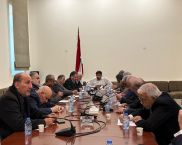Centcom Commanders Will Help the LAF Disarm Hezbollah
- 27/11/2024
- 5 comments
- 36
- 125


This is Beirut 14/01 18:47

This is Beirut 14/01 16:15

Johnny Kortbawi 14/01 12:46

This is Beirut 14/01 09:25

Philippe Abi-Akl 14/01 08:30

This is Beirut 05:45


This is Beirut 14/01 23:05

Mario Chartouni 14/01 20:35

This is Beirut 14/01 19:55
This is Beirut 14/01 18:10
This is Beirut 13/01 21:40
Hala Abdallah 13/01 13:10
Chelsea Al Arif 13/01 12:45

This is Beirut 14/01 18:15

This is Beirut 14/01 15:40

This is Beirut 14/01 15:30

This is Beirut 14/01 13:00

Christiane Tager 11/01 13:00

Marie-Christine Tayah 14/01 18:00

This is Beirut 14/01 16:00

Madeleine Cadoux 14/01 14:00

This is Beirut 14/01 12:30

This is Beirut 14/01 10:30

This is Beirut 14/01 14:50

Makram Haddad 14/01 11:00

This is Beirut 14/01 10:10

This is Beirut 14/01 10:05

This is Beirut 13/01 10:00

This is Beirut 10/01 11:25

This is Beirut 08/01 10:15

This is Beirut 08/01 09:45

This is Beirut 2024-12-18 19:25

Alain E. Andrea 2024-12-10 19:40

par Ici Beyrouth, 05:30


par Ici Beyrouth, 14/01 23:00

par Ici Beyrouth, 14/01 21:49

par Ici Beyrouth, 14/01 21:15